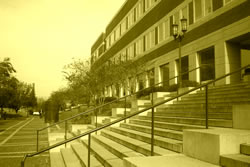|
|||||||
|
|
|
Home |

|
October 15th: The DispossessedAnnouncements
The Dispossessed So now you see why I wanted you to think about gender last week. This novel takes a radical view of gender/ed roles and makes you think about why we have such things as absolute. Now, after reading some of the earlier posts for last week, I realize that many of you are perfectly fine with the separation of gender roles. That doesn't make you evil, so don't think I'm getting at that. Our goal isn't necessarily to try to find out why society has prescribed roles for men and women and attributes associated with masculinity and femininity; instead, we need to identify how those roles affect men and women in society. The first step is identifying them and recognizing that they--gender roles--are all part of the cultural menu that we "freely" pick and choose from.
Define these words
Because this is a two-part discussion on the novel, I'm going to go against LeGuin's attempt to get us to think nonlinearly and try to focus on the first half or so of the book and ground us in some important topics. I know this is a long book, so, if you're not completely done, that's fine, but don't expect us to give away the ending today! You'll need to keep reading. We'll try to cover Revolution and Time in Thursday's class.
What kind of trouble can we get into today...
Topics to Consider
As mentioned above, there are lots of topics to consider. Let's start by identifying the key characters and their missions or goals.
Anarresti Shevek, Sabul, Takver, Odo Urrasti Atro, Oiie, Chifoilisk
Novel of Ideas
This work is consider a novel of ideas, which means it deals with questions usually covered by philosophy and attempts to reconcile, uncover, and challenge readers' ways of thinking about culture and society. What does it mean to be a man or a woman? What does it mean to live in a Capitalist society? What does it mean to be free? All of those are questions that a cultural studies lens (the approach we use to interpret the readings) assists readers in exploring. If you were hoping I'd have written "assists readers in answering," you've missed a few classes.
LeGuin gives readers two worlds to explore from a social science fiction point of view: Anarres and Urras. This work was published in 1974, so, from a historical point of view, we'll have to consider what was going on in America at that time, specifically, the Vietnam War, the Cold War, and the distrust of the government. Other topics we should consider are below:
Moodle2 Posts I've got your prompt for this week's Moodle2 response. What has The Dispossessed made you think about? There are lots of ideas and imagined situations covering topics, such as government, imperialism, education, gender, family, technology, and the list goes on. Good literature entertains you. Great literature changes you, or, at least, makes you keep thinking.
Keep up with your reading and finish LeGuin's The Dispossessed. On Thursday, Art will lead us in a discussion on LeGuin's novel.
... |
||||||||||||||||||||||||||||||||||||||||||||
|
|
|||||||||||||||||||||||||||||||||||||||||||||
| © UNC Charlotte Copyright | Privacy Statement | Page Maintained By: Aaron A. Toscano |
